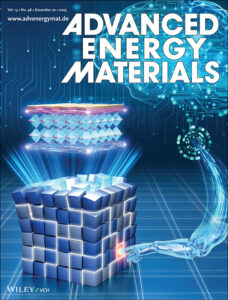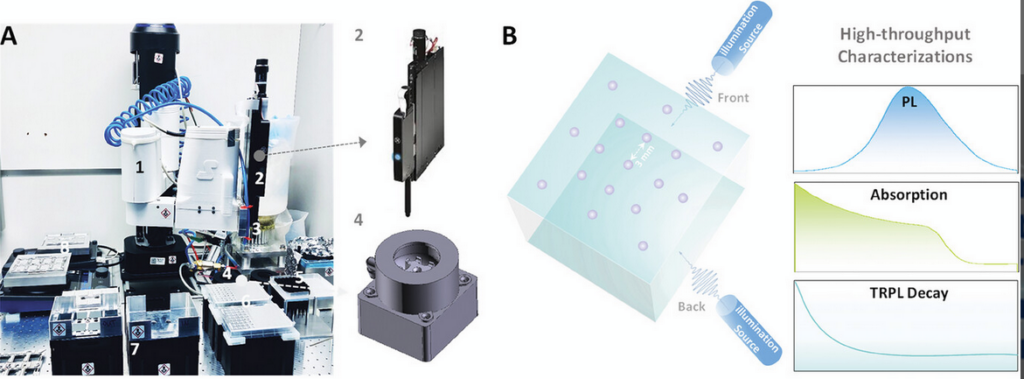Zhang, J., Liu, B., Liu, Z., Wu, J., Arnold, S., Shi, H., Osterrieder, T., Hauch, J. A., Wu, Z., Luo, J., Wagner, J., Berger, C. G., Stubhan, T., Schmitt, F., Zhang, K., Sytnyk, M., Heumueller, T., Sutter-Fella, C. M., Peters, I. M., Zhao, Y., Brabec, C. J., Adv. Energy Mater., 13(48), 2302594. https://doi.org/10.1002/aenm.202302594

Simultaneously optimizing the processing parameters of functional thin films remains a challenge. The design and utilization of a fully automated platform called SPINBOT is presented for the engineering of solution-processed functional thin films. The SPINBOT is capable of performing experiments with high sampling variability through the unsupervised processing of hundreds of substrates with exceptional experimental control. Through the iterative optimization process enabled by the Bayesian optimization (BO) algorithm, the SPINBOT explores an intricate parameter space, continuously improving the quality and reproducibility of the produced thin films. This machine learning (ML)-guided reliable SPINBOT platform enables the acceleration of the optimization process of perovskite solar cells via a simple photoluminescence characterization of films. As a result, this study arrives at an optimal film that, when processed into a solar cell in an ambient atmosphere, immediately yields a champion power conversion efficiency (PCE) of 21.6% with satisfactory performance reproducibility. The unsealed devices retain 90% of their initial efficiency after 1100 h of continuous operation at 60–65 °C under metal-halide lamps. It is anticipated that the integration of robotic platforms with the intelligent algorithm will facilitate the widespread adoption of effective autonomous experimentation to address the evolving needs and constraints within the materials science research community. The paper highlighted as a front cover of Advanced Energy Materials Issue 48, Vol 17

Zhang, J., Liu, B., Liu, Z., Wu, J., Arnold, S., Shi, H., Osterrieder, T., Hauch, J. A., Wu, Z., Luo, J., Wagner, J., Berger, C. G., Stubhan, T., Schmitt, F., Zhang, K., Sytnyk, M., Heumueller, T., Sutter-Fella, C. M., Peters, I. M., Zhao, Y., Brabec, C. J., Adv. Energy Mater., 13(48), 2302594. https://doi.org/10.1002/aenm.202302594
Simultaneously optimizing the processing parameters of functional thin films remains a challenge. The design and utilization of a fully automated platform called SPINBOT is presented for the engineering of solution-processed functional thin films. The SPINBOT is capable of performing experiments with high sampling variability through the unsupervised processing of hundreds of substrates with exceptional experimental control. Through the iterative optimization process enabled by the Bayesian optimization (BO) algorithm, the SPINBOT explores an intricate parameter space, continuously improving the quality and reproducibility of the produced thin films. This machine learning (ML)-guided reliable SPINBOT platform enables the acceleration of the optimization process of perovskite solar cells via a simple photoluminescence characterization of films. As a result, this study arrives at an optimal film that, when processed into a solar cell in an ambient atmosphere, immediately yields a champion power conversion efficiency (PCE) of 21.6% with satisfactory performance reproducibility. The unsealed devices retain 90% of their initial efficiency after 1100 h of continuous operation at 60–65 °C under metal-halide lamps. It is anticipated that the integration of robotic platforms with the intelligent algorithm will facilitate the widespread adoption of effective autonomous experimentation to address the evolving needs and constraints within the materials science research community. The paper highlighted as a front cover of Advanced Energy Materials Issue 48, Vol 17